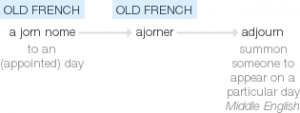Meetings Adjourned
The best part of a terrible meeting: The End!
<figure id="2d1b" class="graf graf--figure graf-after--p">

The highest ranking motion in Robert’s Rules of Order is to “Fix the time to which to adjourn” followed by “Adjourn” and then “Recess”. From this, we can infer that ending a meeting (even briefly) is the most important thing you do at a meeting.
Hermetas was at a meeting of a large student leadership group where adjourning became an issue. It was argued on one side that adjourning would end everything because adjourn means “to end”.
The origin of the word ‘adjourn’ is from the Middle English (in the sense ‘summon someone to appear on a particular day’): from Old French ajorner, from the phrase a jorn (nome ) ‘to an (appointed) day.’
<figure id="88b5" class="graf graf--figure graf-after--p">

So while you are ending the current meeting in one sense, you a really summoning everyone to appear at the next meeting. Simple. Problem solved. Well, no… The common usage of words often confuse, and are confused with, the formal and legal usage of those same words. A meeting, under Robert’s, is “a single official gathering of its members in one room or area to transact business for a length of time during which there is no cessation of proceedings” (except for a short recess).
A session is “a meeting, or series of connected meetings devoted to a single order of business, program, agenda, or announced purpose.”
A meeting, under the California Brown Act, includes any “congregation by a majority” of a legislative body at the same time and place to “hear, discuss, or deliberate” on any matter within the jurisdiction of the body. As the California Attorney General explains: “This definition makes it clear that the body need not take any action in order for a gathering to be defined as a meeting. A gathering is a meeting if a majority of the members of the body merely receive information or discuss their views on an issue. A meeting also covers a body’s deliberations, including the consideration, analysis or debate of an issue, and any vote which may ultimately be taken.”
<figure id="41b6" class="graf graf--figure graf-after--p">

By Diliff — Own work, CC BY-SA 3.0, https://commons.wikimedia.org/w/index.php?curid=35972521
Let’s Review:
- Meeting: A gathering of people to transact official business
- Session: One or more meetings covering the same purpose or event
- Brown Act Meeting: Any time a majority discuss a topic coming under the purview of a body subject to the Act.
It helps to understand that the Brown Act is designed to prevent ‘secret meetings’ of the ‘elite’ from happening outside the eye of public scrutiny. Therefore, the Act has a ridiculously broad definition of the word meeting. Robert’s has a definition of meeting that has been used since before anyone can remember in the formal decision-making processes. Most of us have an informal definition of meeting which is “When two or more people meet, i.e. talk to each other.”
Most Brown Act meetings will take place under Robert’s. As such, the terms that Robert’s gives us should be used for clarity. This means you might post a notice of a Brown Act Meeting that begins Friday at 8 am and end on Sunday at 12 pm. Your notice would include several meetings in the single session. That single session and the Brown Act meeting would cover the same time.
The Chair of a meeting should interpret what is being moved by a member in the most correct way possible. If a member says “I move to adjourn.” The chair could reasonably state: “It has been moved, and seconded, to adjourn until our next meeting of the session at 1 pm.” This will avoid any concern that the session has been ended.
Pro Tip: A recess is brief and when you return from a recess you begin right where you left off, perhaps even in the middle of debate. A meeting has been adjourned and not recessed if, when you return, you begin with opening items like roll call.
Posted from my blog with SteemPress : https://www.hermetas.org/meetings-adjourned/
Congratulations @hermetas! You have completed some achievement on Steemit and have been rewarded with new badge(s) :
Click on the badge to view your Board of Honor.
If you no longer want to receive notifications, reply to this comment with the word
STOPTo support your work, I also upvoted your post!